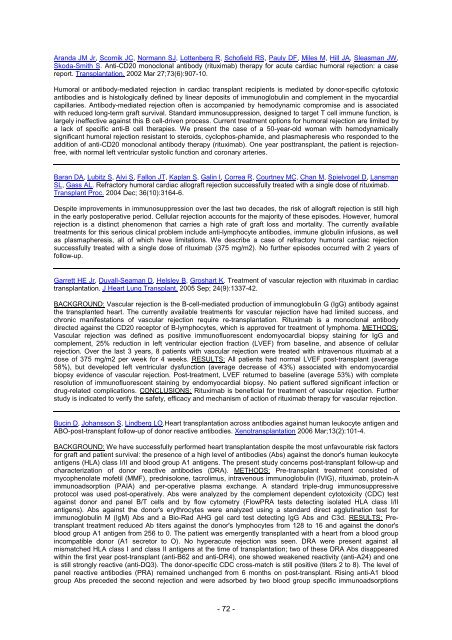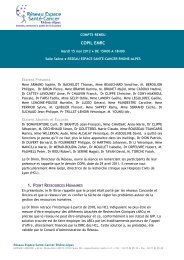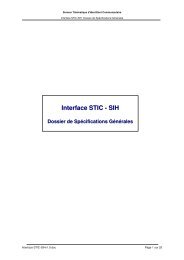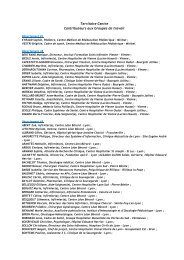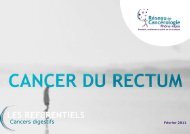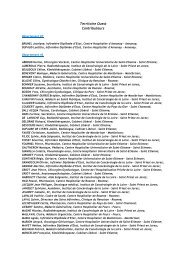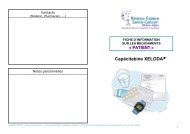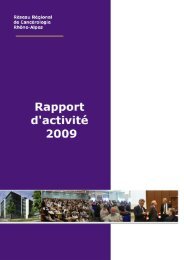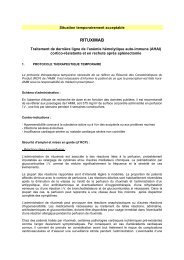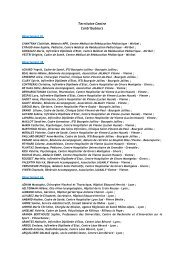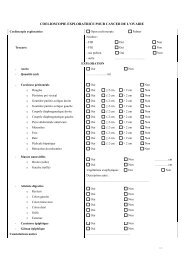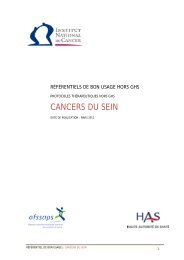rituximab
rituximab
rituximab
Create successful ePaper yourself
Turn your PDF publications into a flip-book with our unique Google optimized e-Paper software.
Aranda JM Jr, Scornik JC, Normann SJ, Lottenberg R, Schofield RS, Pauly DF, Miles M, Hill JA, Sleasman JW,Skoda-Smith S. Anti-CD20 monoclonal antibody (<strong>rituximab</strong>) therapy for acute cardiac humoral rejection: a casereport. Transplantation. 2002 Mar 27;73(6):907-10.Humoral or antibody-mediated rejection in cardiac transplant recipients is mediated by donor-specific cytotoxicantibodies and is histologically defined by linear deposits of immunoglobulin and complement in the myocardialcapillaries. Antibody-mediated rejection often is accompanied by hemodynamic compromise and is associatedwith reduced long-term graft survival. Standard immunosuppression, designed to target T cell immune function, islargely ineffective against this B cell-driven process. Current treatment options for humoral rejection are limited bya lack of specific anti-B cell therapies. We present the case of a 50-year-old woman with hemodynamicallysignificant humoral rejection resistant to steroids, cyclophos-phamide, and plasmapheresis who responded to theaddition of anti-CD20 monoclonal antibody therapy (<strong>rituximab</strong>). One year posttransplant, the patient is rejectionfree,with normal left ventricular systolic function and coronary arteries.Baran DA, Lubitz S, Alvi S, Fallon JT, Kaplan S, Galin I, Correa R, Courtney MC, Chan M, Spielvogel D, LansmanSL, Gass AL. Refractory humoral cardiac allograft rejection successfully treated with a single dose of <strong>rituximab</strong>.Transplant Proc. 2004 Dec; 36(10):3164-6.Despite improvements in immunosuppression over the last two decades, the risk of allograft rejection is still highin the early postoperative period. Cellular rejection accounts for the majority of these episodes. However, humoralrejection is a distinct phenomenon that carries a high rate of graft loss and mortality. The currently availabletreatments for this serious clinical problem include anti-lymphocyte antibodies, immune globulin infusions, as wellas plasmapheresis, all of which have limitations. We describe a case of refractory humoral cardiac rejectionsuccessfully treated with a single dose of <strong>rituximab</strong> (375 mg/m2). No further episodes occurred with 2 years offollow-up.Garrett HE Jr, Duvall-Seaman D, Helsley B, Groshart K. Treatment of vascular rejection with <strong>rituximab</strong> in cardiactransplantation. J Heart Lung Transplant. 2005 Sep; 24(9):1337-42.BACKGROUND: Vascular rejection is the B-cell-mediated production of immunoglobulin G (IgG) antibody againstthe transplanted heart. The currently available treatments for vascular rejection have had limited success, andchronic manifestations of vascular rejection require re-transplantation. Rituximab is a monoclonal antibodydirected against the CD20 receptor of B-lymphocytes, which is approved for treatment of lymphoma. METHODS:Vascular rejection was defined as positive immunofluorescent endomyocardial biopsy staining for IgG andcomplement, 25% reduction in left ventricular ejection fraction (LVEF) from baseline, and absence of cellularrejection. Over the last 3 years, 8 patients with vascular rejection were treated with intravenous <strong>rituximab</strong> at adose of 375 mg/m2 per week for 4 weeks. RESULTS: All patients had normal LVEF post-transplant (average58%), but developed left ventricular dysfunction (average decrease of 43%) associated with endomyocardialbiopsy evidence of vascular rejection. Post-treatment, LVEF returned to baseline (average 53%) with completeresolution of immunofluorescent staining by endomyocardial biopsy. No patient suffered significant infection ordrug-related complications. CONCLUSIONS: Rituximab is beneficial for treatment of vascular rejection. Furtherstudy is indicated to verify the safety, efficacy and mechanism of action of <strong>rituximab</strong> therapy for vascular rejection.Bucin D, Johansson S, Lindberg LO.Heart transplantation across antibodies against human leukocyte antigen andABO-post-transplant follow-up of donor reactive antibodies. Xenotransplantation 2006 Mar;13(2):101-4.BACKGROUND: We have successfully performed heart transplantation despite the most unfavourable risk factorsfor graft and patient survival: the presence of a high level of antibodies (Abs) against the donor's human leukocyteantigens (HLA) class I/II and blood group A1 antigens. The present study concerns post-transplant follow-up andcharacterization of donor reactive antibodies (DRA). METHODS: Pre-transplant treatment consisted ofmycophenolate mofetil (MMF), prednisolone, tacrolimus, intravenous immunoglobulin (IVIG), <strong>rituximab</strong>, protein-Aimmunoadsorption (PAIA) and per-operative plasma exchange. A standard triple-drug immunosuppressiveprotocol was used post-operatively. Abs were analyzed by the complement dependent cytotoxicity (CDC) testagainst donor and panel B/T cells and by flow cytometry (FlowPRA tests detecting isolated HLA class I/IIantigens). Abs against the donor's erythrocytes were analyzed using a standard direct agglutination test forimmunoglobulin M (IgM) Abs and a Bio-Rad AHG gel card test detecting IgG Abs and C3d. RESULTS: Pretransplanttreatment reduced Ab titers against the donor's lymphocytes from 128 to 16 and against the donor'sblood group A1 antigen from 256 to 0. The patient was emergently transplanted with a heart from a blood groupincompatible donor (A1 secretor to O). No hyperacute rejection was seen. DRA were present against allmismatched HLA class I and class II antigens at the time of transplantation; two of these DRA Abs disappearedwithin the first year post-transplant (anti-B62 and anti-DR4), one showed weakened reactivity (anti-A24) and oneis still strongly reactive (anti-DQ3). The donor-specific CDC cross-match is still positive (titers 2 to 8). The level ofpanel reactive antibodies (PRA) remained unchanged from 6 months on post-transplant. Rising anti-A1 bloodgroup Abs preceded the second rejection and were adsorbed by two blood group specific immunoadsorptions- 72 -


